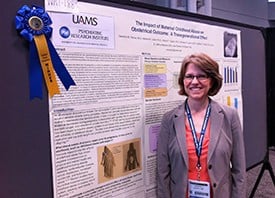Research Links Abuse and Pregnancy Problems
| 
Veronica Raney, M.D., with her winning poster.
Veronica Raney, M.D., a third-year medical resident with the Department of Psychiatry in the UAMS College of Medicine, has always been fascinated by the ability of the human body to overcome adversity. In recent years, medical research has focused on vulnerability to illness, but Raney has taken a novel direction by trying to better understand the factors associated with resilience.
Raney sees outpatients at the Little Rock Community Health Center as well as the UAMS Psychiatric Research Institute’s Walker Family Clinic. Her experience in these settings stimulated her interest in the long-term effects of early-life abuse and the potential consequences of that abuse on the next generation.
“We know that abuse can lead to all sorts of mental and physical problems but I was interested in the children of these women who had experienced abuse in childhood,” said Raney. “I wanted to find out how much the environment affected the children and how much their mothers’ abuse history affected them. It’s the whole ‘nature vs. nurture’ thing.”
A 2011 graduate of the UAMS College of Medicine, Raney decided to examine the earliest developmental environment — pregnancy. To isolate the effects of early-life abuse from environmental and psychosocial factors, Raney collaborated with Josh Cisler, Ph.D., of PRI’s Brain Imaging Research Center to examine different variables and risk factors associated with maternal abuse and pregnancy outcomes.
Using a database compiled by her mentor, Zachary Stowe, M.D., medical director of PRI’s Women’s Mental Health Program, Raney compiled a sub-group of 970 individuals with a total of more than 1,300 pregnancies. The subjects were mostly white, college-educated, married women with a history of psychiatric illness, all of whom had prenatal care, said Raney.
“Some of them had minimal or no abuse, some of them had suffered severe abuse. All of them filled out a Childhood Trauma Questionnaire (a commonly used scale to measure abuse), and using the results allowed me to isolate the effects of abuse on their pregnancy outcomes,” Raney said.
After ruling out other possible causes for possible problems during delivery, such as substance abuse, Raney found that mothers with childhood abuse histories had a 10 percent increased risk of having a birth that required specialized care for their babies. One in five of the babies spent time in the special nursery care unit, primarily related to respiratory distress. Severe physical abuse during childhood led to delivery being one week earlier on average than those women with no physical abuse history.
“We didn’t expect to see such a high rate of problems with this population, especially since they all received good care leading up to their deliveries,” said Raney. “Hopefully this will lead to taking into account the effect abuse can have on a pregnancy. It’s one more factor that needs to be assessed when monitoring a mother’s pregnancy in anticipation of any detrimental effects.”
Improving understanding of the impact of early abuse, the effects on the children of these women who suffered early abuse, and the characteristics associated with resilience – or protection from illness – are vital steps in early identification and intervention development in at-risk children, Stowe said.
“The exceptional efforts and novel results by Dr. Raney and Dr. Cisler underscore the potential adverse consequences of early-life abuse. The fact that the study population had very few risk factors for a non-optimal pregnancy needs to be emphasized. They clearly demonstrated maternal physical abuse occurring long before the pregnancy influenced pregnancy outcome,” said Stowe.
He said the findings suggest that early abuse may be a contributor to two of the most costly outcomes, preterm delivery and NICU/Special Nursery admission. Further, the impact on pregnancy outcome could partially explain or directly contribute to the risks for later illnesses (medical and emotional) in the offspring.
“Clinical research of this type, spanning generations, has enormous public health implications and may help to explain mechanisms associated with later risk in children and adults,” Stowe said.
Raney presented her work at the American Psychiatric Association’s annual meeting May 3-7 in New York. Her poster, “Impact of Maternal Early Trauma on Obstetrical Outcome,” won first place in the Psychosocial and Biomedical category, one of four top prize winners in the resident and student poster competition. More than 200 research posters from physicians all over the country were submitted to the competition. Jessica Coker, M.D., a second-year resident in the UAMS Department of Psychiatry, was the runner-up in the same category with her poster, “Predictors of Suicidal Ideation in Postpartum Women.” Raney and Coker both utilized the database and biobank maintained by Stowe that serve as the foundation for the Transgenerational Biorepository led by Richard Jacobs, M.D. at the Arkansas Children’s Hospital Research Institute.